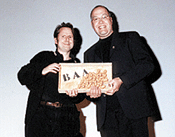With the demise of Cardiff ancient history, the U.K.'s animation crowd is springing back to life with a number of lively new events. Andrew Osmond takes a closer look at this year's activity.
At the start of 1999, Irene Kotlarz concluded her report "Animation Festivals: A Year of Proliferation and Change" on the world festival scene -- with special attention to Vital's failure -- with the comment, 'It seems unlikely Britain will see another broad-based international animation festival any time soon.' Her claim has borne out. Certainly, there hasn't been any British event on a comparable scale since Vital crashed and burned, to the tune of perhaps a hundred thousand pounds-worth in debts. Yet festival activity stays lively, and there's a strong sense of rebuilding. Britain may not be able to produce anything in Annecy's league for the moment, but there's plenty going on.

One recent big event was the British Animation Awards (BAA). The third edition of these biannual ceremonies, it was held in London's National Film Theatre, and like its predecessors was completely sold out. Three of the awards were in 'Public Choice' categories, voted for in nine cities at venues including Bristol's Watershed and Cardiff's Chapter cinema. The winning films have embarked on a countrywide tour till September, and are also going abroad.
Meanwhile, independent and foreign animation is playing in local cinemas. For example, the Welsh-Russian film The Miracle Maker had a limited theatrical outing this spring, while London's Institute of Contemporary Arts has recently run retrospectives of Osamu Tezuka and Jan Svankmajer. There are also clubs such as London's Halloween Society and Film Arts Norwich (FAN), which specialize in screening diverse short films, including animation. FAN is preparing a festival for this October (there's more information below).

Animated Exeter
One participant in the BAA 'Public Choice' voting was Animated Exeter. This was a brand-new, five-day festival in southwest England, held between the 18th and 22nd of February. As an organiser explained, 'Exeter City Council was looking to extend the calendar of arts events to raise the city's cultural profile. Cardiff's demise presented an opportunity, and we thought there might be an opportunity to build on Exeter's media activities, using the centrally located venues for screenings and production activities.
'The size of our media economy didn't warrant an industry-oriented festival, but the strength of our arts and educational base suggested an animation week combining screenings, production workshops and interactive shows. We focused on children and young people, with workshops and screenings ranging from those for the very young through to the club scene and students. The event was held in the February half-term holiday.'
The resulting programme consisted of the three BAA 'Public Vote' sessions, along with a collection of 'Children's Animation Film from the South West.' This local showcase included representatives from Honeycomb Animation, a festival backer, together with A for Animation, Bumper Films, Alison DeVere Animation and King Rollo.
A sister strand, 'Prize Winning European Children's Animation,' focused on the Belgian animator An Vrombaut (Little Wolf, When I Grow Up I Want To Be A Tiger). It included the first public screening of Vrombaut's new film, 64 Zoo Lane. There was also an intriguing range of feature animation, from The Iron Giant and the Bakshi-animated Lord of the Rings, through to the anime horror Perfect Blue and the South Park movie.
On the event side, workshops were aimed at carefully defined age groups. There was a 'hands-on' session for youngsters, using zoetropes, plasticine and scratch animation, while slightly older visitors attended a digital animation workshop using Mac computers, software and cameras. Meanwhile there was an 'Interactive Animation' session to show the process from storyboarding to production, and a newcomer-friendly 'Meet the Industry' panel. ('Your chance to find out how the film and television industry works.') Then there were 'Interactivities' ('Workshops in Club Technology') for those wanting to play with Web animation or video, sound and digital mixing.

Early reports suggest Animated Exeter was a success, and looks certain to become an annual event. The Interactivities drew the highest numbers (about 1300) but the Children's Workshops were also fully booked. Public Choice screenings had better attendance than Bristol, Cardiff or Cambridge, and the total number of people attending at some point was 'toward three thousand.' My contact notes, 'We need to develop a public audience for the long-term future of such a festival. There has to be local relevance, building on the existing infrastructure and distinct talents in the region.' However, she added, 'I'd hope this emphasis does not exclude scope for the industry sector to develop in an equally relevant and distinctive way.'
The Animated Exeter event is a fledgling cousin to another British annual, the Bradford Animation Festival (BAF!). Operating continuously since 1994, this festival runs for five or six days a year (most recently in 1999). Organiser Bill Lawrence has similar sentiments to those above. In his view, 'Festivals always face the problem of who or what leads their agenda. Inevitably, you must ground the festival in a local audience, as well as a relevance to the industry. However, without a core audience of regular festival-goers, the event is unstable. It's important to develop local audiences that will buy into the art and become regulars.'
The question of how to balance public and industry appeal is especially relevant in Britain, given that many people think Vital went wrong in this area. The Cardiff event seemed committed to big studio recruitment, an attitude that backfired when the majors didn't turn up. There were also allegations of anti-Cardiff feeling among Vital organisers, which in turn are said to have led to an unfriendly festival unsupported by the town.
Animated Encounters
Post mortems aside, there's a strange feeling that what was the Cardiff festival has now come home. For the first time in a decade, Bristol's Watershed Centre has hosted its own convention, Animated Encounters, a three-day event from the 19th to the 21st of May. Like the Exeter festival, it was definitely orientated to the public, with the emphasis nearly all on screenings. The only 'workshop' as such was a laid-back 'Interact' event on Sunday, where one could chat to reps from Aardman and Fictitious Egg and play with Web animation.
Animated Encounters grew out of the Watershed's Brief Encounters short film festivals, and was undoubtedly boosted by a certain poultry-themed Aardman movie. According to a local report, DreamWorks donated £10,000 to the event. Nonetheless, the chicken presence was modest, amounting only to a whimsical opening programme of bird-brained films (Henpecked Duck, Norman McLaren's La Poulette Grise), climaxing with the first ten minutes of that movie. A nice bonus, though, was the presence of exec. producer Michael Rose and one of the Aardman animators, participating in a short but informative Q&A session.

Another bonus of the Bristol screenings were that plenty of the filmmakers were in the audience, so one knew who to applaud (or not). Among the programmes were a children's section (including The Wombles and The Powerpuff Girls) and an airing of the recently announced BAA winners. Bristol, meanwhile, got a collection of its own. Most of the titles were familiar (War Story, Little Dark Poet) but one intriguing representative was The Audition, a 1980 cel film directed by Bill Mather using the 'real-life conversation' device more familiar in model animation.
A wider British programme featured several witty titles: Mark Baker's Oscar-nominated Jolly Roger, the UK premiere of Sandra Ensby's two-timing romance Fast Spin Fling and Tracy Spottiswoode's very sharp Codename: Corgi (described as 'A tragi-comic tale of sex, spies and laverbread'). A more acquired taste was Aardman's unlovely Web-star Angry Kid, who popped up all through the screenings. This writer confesses a strange sympathy with the ginger-haired troll, but I couldn't help wondering why Aardman selected foul-mouthed episodes when there were kids in the audience. Though the said episodes were very funny...
Two international programmes encompassed an admirable range of styles. A pair of films from opposite ends of the spectrum were especially well-received. These were Konstantin Bronzit's hilarious French At the Ends of the Earth, about an unstable house, and the German film The Periwig-Maker (director Stefen Schaffler), a beautifully-rendered model animation set in plague-infested London. There was also a late-night airing of 'outrageous animation,' including favourites such as Bambi Meets Godzilla and The Clinton Out-Takes. This benefited from being preceded by a gross-out live cabaret, featuring the self-mutilating Incredible Blood Brothers.

All of these were near or full sell-outs, but the greatest enthusiasm was reserved for the 'Watch With Mother '70s Classics' on Saturday night. This might sound like another children's screening, but don't be fooled. The audience was packed with twenty- and thirtysomethings, staring enraptured at child icons embedded deep into their psyche; The Clangers, Ivor the Engine, Mr. Benn... Even for non-nostalgia freaks, the vision of these (mostly model) series can't be denied, and their charm is untarnished. Among the names on these '70s productions were Peter Lord, David Sproxton and Bob Godfrey.
To round things off, there were also two feature screenings, one quite a coup. The Watershed is in the happy position of having an IMAX cinema located just behind it, and on Sunday morning attendees could see a special screening of The Old Man and the Sea, Aleksandr Petrov's Oscar-winning painting-on-glass. The other showing was Fantasia/2000, oddly in normal cinema-sized format rather than another IMAX special. Nonetheless, Disney's musical update still looked good.
A more unorthodox item was Desert Island Flicks, where comedian Phil Jupitus selected his favourite toons in a version of the radio staple Desert Island Discs. It sounded a recipe for disaster, but Jupitus, for all his self-deprecation, plainly knew his stuff. He was soon in earnest discussion of the relative merits of Avery, Jones and Clampett, and his love for the medium was obvious. (For the record, Jupitus rated "Rabbit of Seville" well above "What's Opera, Doc?") His British picks, meanwhile, included the BAA-winning Big Knights series and Aardman's Rex the Runt.

What Next?
There's little doubt that Animated Encounters was another success. The screening-rooms were packed and everyone seemed to be thoroughly enjoying themselves. The organisers fully intend the event to be the first in a series. If all goes well in Exeter, there may be two new regular strands for British animation-lovers to enjoy. And more may follow. The Welsh Animation Group (WAG) is pressing for a more local-friendly Welsh event to make up for Vital. Over in Norwich, FAN plans an International Short Film & Animation Festival from October 26th to 29th. This promises to showcase animations from Britain and overseas, with competitions in both live-action and animated categories.
There are, of course, still questions about where British festivals should head, and how to avoid the over-reaching hubris of Vital. But such worries are for the future. For now, British festival animation is enjoying a new lease of life. It's a great position from which to make a new start.
Andrew Osmond is a freelance writer specializing in fantasy media and animation.








